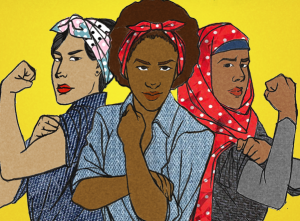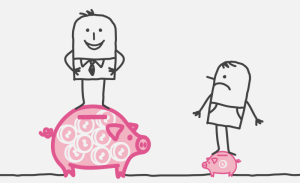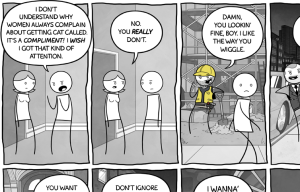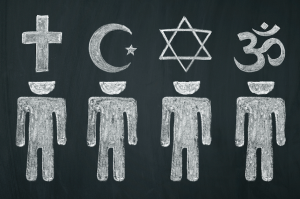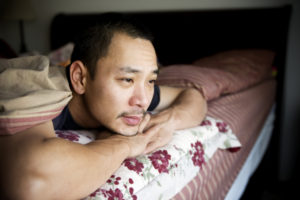
A person lies on their stomach in bed, resting their head on their hands.
Originally published on The Body Is Not an Apology and cross-posted here with their permission.
Dear Reader,
I am willing to bet that you’re reading this in the middle of a million other tasks that you feel like you need to do in order to feel “normal.”
Or maybe you’re reading this in an attempt to get yourself out of a rut or improve your depression.
Either way, I’m here to help!
A lot of times, we (meaning you, me, and everyone we know, honestly) feel like if we aren’t doing something, we are failing.
On the contrary: If we aren’t doing something, that might be for a reason, and we need to be in tune with why that is.
You see, sometimes it’s enough to just be surviving in the world – “just getting by” is totally okay, because it happens to all of us.
We all hit a point from time to time where we just cannot sustain whatever routine or tasks we’ve been doing. In these times, it’s easy to forget to really take care of ourselves and understand that stopping or slowing down can actually be good for us.
And if you feel like you have been doing nothing for too long, then that’s okay, too!
Dear reader, below, I have eight ways you can remember to not be so hard on yourself when all you feel you can do is survive.
1.You Don’t Have to Finish All of Your Tasks in a Day
Whether you’re depressed or you’ve been busy with work or school, sometimes your tasks start to pile up. This can include homework, dishes, laundry, vacuuming, sweeping, going to the DMV, going to the doctor, or even just remembering to call someone.
You feel helpless thinking about getting everything done, especially as you start to think of those tasks as urgent, no matter how urgent they may actually be.
Then, in an effort to get on track to completing those tasks, you get into the mindset of “Everything will get done today – no stopping, only doing!”
While it seems like a good mindset to have, it can actually be more destructive in some ways than feeling helpless.
When we set these goals up for ourselves to get every single tasks or chore done, we are almost always setting ourselves up for failure and disappointment.
It can be extremely difficult to get all of those things done in one day, and when it doesn’t happen, it feels like we failed – and then we might slump back into feeling helpless and letting things pile up again.
Remember that it’s better to take on tasks individually and complete them without feeling the need to rush on to the next thing.
This way, you’re moving at a pace that is more beneficial to your mental health and can foster the development of a routine where tasks get done more consistently – rather than perpetually trying to finish everything and ending up feeling helpless.
2. Slow Down and Take It Easy
No matter what anyone says, we’re typically a lot busier than people were twenty or thirty years ago.
It may not seem like it on the surface, but we occupy a ton of our time doing something – using our phones, reading articles (like right now!), texting friends, watching TV, going to school or work, exercising, playing video games – as opposed to relaxing.
It’s easier now than it ever has been to constantly be distracted by something or be involved in some activity at all waking hours.
It has become the norm to think that go-go-go is the only way to live, when sometimes you just need to stop, or at the very least slow down.
Like the point above, sometimes we just need to realize when we’re pushing ourselves too hard to be doing literally anything. It’s important to come to terms with the fact that taking time for yourself to just relax is good for you. You just need to remember to breathe deeply from time to time.
In the same vein, when you feel like you just can’t do all of those things you’re accustomed to doing, whether it’s because you’re tired or depressed, then that’s okay, too.
You do not have to constantly be doing something in order to be “okay.”
3. Sleep Is Important (And That Includes Naps!)
While you are in go-go-go mode like we talked about above, you often forget to do the things that actually matter for your survival.
One of the first important activities that goes is really more of an inactivity: sleep.
You probably find yourself constantly tired, feeling like you haven’t had enough sleep, or like you have to stay awake to do all of the things you didn’t get to do during typical waking hours.
The basic, flat-out truth is that sleep is good for you.
Letting your body and brain rest during sleep is one of the reasons why we’ve survived as a species, because we’re sharper, more efficient, and happier when we’ve slept.
Of course, sometimes our schedules (or sleep disorders or other health conditions) make it hard to sleep at night. While you’re making time to just relax, you could also benefit from finding time to take naps if you need them, especially if your schedule or condition tends to make you sleepy during the day.
4. Don’t Starve Yourself – Of Food or Love
Sleep isn’t the only thing we lose when we are too focused on getting all of our daily tasks done, feeling like we just can’t do anything, or because we’re experiencing appetite changes from depression.
Food is often one of those things we forego, whether it’s eating less than normal or not eating at all, even for days at a time.
Please remember that in order to survive and get to the next day, you have to treat your body with care – and that means nourishing it properly.
Another thing we tend to deny ourselves in these times is love and support, which are both important parts of surviving.
If there’s nothing else you can do, you should at the very least make sure you’re surrounding yourself with love and treating your body with the care it deserves, even if it seems impossible.
You and your body will be much happier.
5. It’s Okay to Like What You Like
Whether we’re trying to get everything done at once or we’re feeling depressed, we often forget that we deserve to do things that make us feel good. For many of you, I would bet that you’ve not done something that makes you truly feel good in the last day, two days, week, or even longer.
Sometimes it’s because we feel like we just don’t have the time or because we feel like we don’t deserve to feel good. It might even have to do with a feeling of shame. Perhaps someone’s made you feel bad for something you enjoy, like what makes you feel good isn’t “normal.”
First, you definitely deserve to feel good, and you definitely deserve to do things that make you feel good, especially if that means you’re surviving to the next day.
You deserve to spend time doing whatever it is that you love doing (as long as you aren’t harming anyone or anything else, of course!).
But even more importantly, you should never feel ashamed of the things that you like, whether it’s music, a video game, listening to a podcast, watching a TV show, or even just sleeping – because, like I said, sleep is good for you.
6. It’s Okay to Avoid Stressful Social Situations
You’ve probably found yourself on at least occasion at a party, function, or event that you truly didn’t want to attend.
Maybe you just don’t like the people who were going to be there, or your friends guilted you into getting out of the house. You end up spending the whole time thinking about all of the other things you would rather be doing, not enjoying the time spent in a situation you didn’t want to be in to begin with.
It’s much easier said than done, but you don’t have to subject yourself to uncomfortable social situations if you don’t want to.
You shouldn’t have to explain yourself, either – just a simple “Sorry, I can’t go this time” should be enough for understanding friends.
Your first responsibility is yourself, and you need to make sure that you’re okay.
You do not need to feel bad for not wanting to put yourself in a situation you’re going to feel bad in anyway. We must learn to be happy by ourselves more often.
7. Don’t Be Afraid to Accept Help from People Who Care
There are many times where we feel like we need to handle our problems by ourselves. We feel like no one else will care about our issues, or we feel like we can’t trust other people to really help us.
You might have experienced this with even your closest friends. Maybe sometimes you might feel like you bother your friends too much or that they just don’t understand.
While trying to spend the days not interacting with others can sometimes be a good way to avoid additional drama, some days that distance can be a hindrance.
Sometimes, surviving means letting people in who will help you make it through the hard times.
If you have people that you consider close, whether it is friends, family, a romantic partner, even a co-worker, you should try to reach out, explain your needs, and be willing to accept whatever help they are want to give.
Surviving can certainly be enough, and surviving can certainly be okay – but remember that surviving doesn’t have to happen in solitude.
8. You Don’t Have to Be Perfect
What all of this boils down to is one simple concept:
You don’t have to be perfect. Surviving is enough, and you should not feel bad if that is all you can manage sometimes.
You do not have to do every single little thing that you’ve decided is important to do. You do not have to cater to the needs or norms of the people in your life if it might be harmful to you or your mental health.
You do not need to be ashamed of loving what you love or doing things that make you feel good. You do not need to give up sleep or naps because you feel like they are just a waste of time.
As long as you aren’t hurting yourself, as long as you can manage to survive the day, then you are doing just fine – and that, by itself, is perfect.
[do_widget id=’text-101′]
Philippe Leonard Fradet is a mixed-race writer, fat activist, and aspiring fat studies researcher and educator currently living in New Orleans. Philippe has a Master’s degree in Sexuality Studies from SFSU and writes on body positivity, masculinity and gender, and race for The Body Is Not an Apology. He has given lectures on fat sexuality, queer theory, and sex education, and was a co-panelist with fat activist and writer Virgie Tovar on a panel titled “Fat Shame: The Politics of Body Image, Gender & Reclamation.” Read his articles here.
Search our 3000+ articles!
Read our articles about:
Our online racial justice training
Used by hundreds of universities, non-profits, and businesses.
Click to learn more










